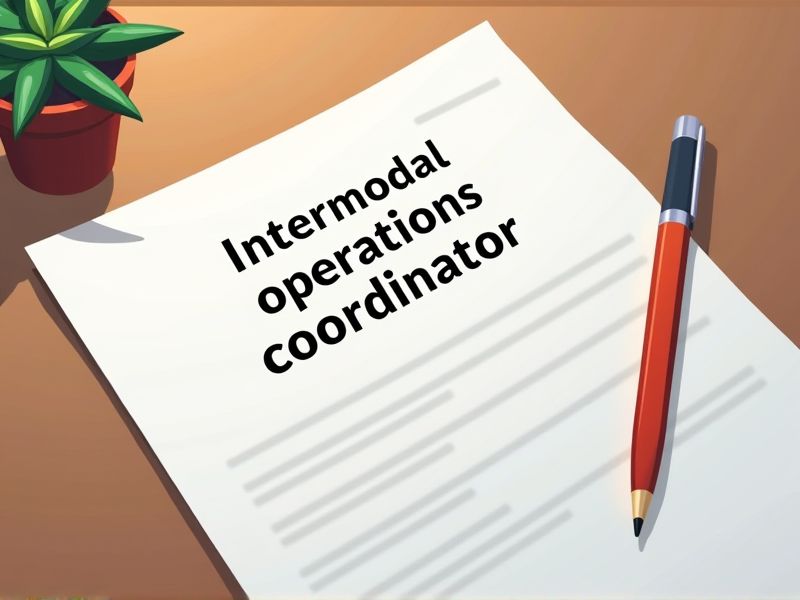
An Intermodal Operations Coordinator plays a crucial role in the seamless integration and coordination of various transportation modes, necessitating a thorough understanding of logistical frameworks and procedures. Certifications in logistics and supply chain management equip coordinators with essential skills in planning, executing, and overseeing complex transportation networks. These certifications also validate their expertise in ensuring regulatory compliance and enhancing operational efficiency. Some important certifications you may need for an Intermodal Operations Coordinator position include those focused on logistics management, safety regulations, and supply chain analytics.
Certified Transportation Professional (CTP)
Obtaining a Certified Transportation Professional (CTP) designation enhances the credibility and expertise of an intermodal operations coordinator, making it essential for efficient transport management. The certification provides comprehensive knowledge in transportation laws, logistics procedures, and safety regulations, ensuring adherence to industry standards. With CTP credentials, coordinators can streamline processes, reduce costs, and improve service reliability by implementing best practices. Employers often prefer CTP-certified professionals due to their proven ability to manage complex multimodal transport operations effectively.
Certified in Logistics, Transportation and Distribution (CLTD)
Intermodal operations coordinators require a strong understanding of supply chain processes, and the Certified in Logistics, Transportation and Distribution (CLTD) provides comprehensive knowledge in these areas. The CLTD certification enhances proficiency in inventory management, order management, and logistics strategy, essential for coordinating different transport modes efficiently. The certification equips coordinators with the latest industry practices and technologies, improving decision-making and operational efficiencies. Employers often view the CLTD credential as a demonstration of expertise, which can lead to increased job opportunities and career advancement.
Certified Supply Chain Professional (CSCP)
Obtaining a Certified Supply Chain Professional (CSCP) credential elevates an individual's understanding of global supply chain management, which is crucial for overseeing complex intermodal operations. The credential equips professionals with the knowledge of logistics, operations, and technology integration, enabling more effective coordination across various transportation modes. Having a CSCP designation signifies the ability to develop efficient strategies that reduce costs and enhance service delivery within intermodal operations. Possessing this certification often leads to improved problem-solving skills, which are essential for addressing the dynamic challenges faced in intermodal logistics.
Intermodal Operations Certification (IOC)
Intermodal Operations Certification (IOC) enhances an intermodal operations coordinator's ability to manage logistics involving multiple modes of transport efficiently. It aligns their skills with industry standards, improving coordination and reducing operational delays. Certified coordinators bring expert knowledge to ensure compliance with safety and regulatory requirements, minimizing risks. Certification contributes to professional credibility, fostering trust among employers and clients.
Transportation Worker Identification Credential (TWIC)
The Transportation Worker Identification Credential (TWIC) is needed for an Intermodal Operations Coordinator to ensure secure access to maritime facilities and vessels. Without a TWIC, coordinators cannot enter secure areas, hindering their ability to efficiently manage logistics and shipments. The TWIC validates the individual's identity and background, which reduces the risk of security breaches in high-threat environments. Compliance with federal regulations mandates the possession of a TWIC for those involved in maritime and intermodal operations.
Hazardous Materials Transportation Certification (HMTC)
Hazardous Materials Transportation Certification (HMTC) is needed for an Intermodal Operations Coordinator to ensure compliance with safety and regulatory standards governing the transport of hazardous materials. Coordination of various transport modes necessitates a deep understanding of risks associated with different hazardous material classes. Certification plays a critical role in mitigating potential environmental and public health impacts caused by mishandling. An intermodal coordinator equipped with HMTC can effectively devise and enforce plans to handle accidents or spills, reducing liability and enhancing operational efficiency.
Lean Six Sigma Green Belt Certification
Intermodal operations often involve complex logistics, where Lean Six Sigma Green Belt Certification helps in streamlining processes and reducing waste. The certification equips coordinators with problem-solving skills essential for optimizing cargo flows. With these skills, coordinators can enhance operational efficiency by identifying and eliminating bottlenecks. Improved processes lead to cost savings and increased customer satisfaction in intermodal logistics.
ISO 9001 Quality Management Certification
ISO 9001 Quality Management Certification ensures that an intermodal operations coordinator adheres to globally recognized standards, boosting reliability in logistics processes. The certification emphasizes continuous improvement, which directly impacts efficiency and reduces operational errors in managing complex supply chains. It also enhances trust with clients and partners, as certified coordinators demonstrate a commitment to quality and customer satisfaction. Holding this certification can potentially open up new business opportunities, as many companies prefer to engage with certified professionals.
Project Management Professional (PMP)
The complexity of intermodal operations necessitates a Project Management Professional (PMP) certification to ensure efficient coordination across multiple transportation modes. PMP equips coordinators with structured methodologies that enhance resource allocation and schedule adherence. Operational risks and challenges in intermodal logistics demand a strong framework for problem-solving, which PMP provides. Better communication and stakeholder management achieved through PMP result in smoother operations and improved service delivery.
Certified Customs Specialist (CCS)
Intermodal operations coordinators manage complex logistics involving multiple forms of transportation, making customs knowledge critical to ensure smooth transitions between borders. Certified Customs Specialists provide expertise in customs regulations, which reduces the risk of compliance issues and delays in shipments. Understanding the intricacies of international trade regulations aids coordinators in optimizing routes and improving overall efficiency in transit processes. The ability to navigate customs procedures effectively can lead to cost-effective operations, minimizing unexpected expenses related to fines or mismanaged duties.
Summary
By obtaining certifications, you'll likely enhance your expertise and credibility in intermodal logistics. Certification can lead to increased job opportunities and higher earning potential within the industry. It may also improve your problem-solving skills, enabling you to manage complex operations more efficiently. Greater recognition from peers and industry leaders is another potential benefit of acquiring such credentials.
